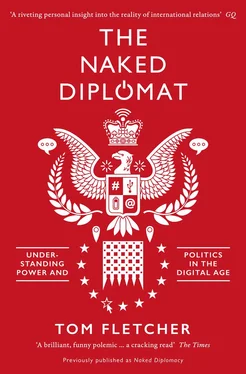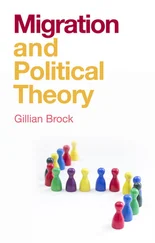Maritime expansion by the early European empires created the need for further rules and negotiation, not least because failure to observe increasingly complex protocol could trigger conflict. Elizabeth I was clearly a sharp and perceptive observer of diplomatic vanity, and banned her ambassadors from accepting awards or insignia from other nations – ‘I would not have my sheep branded by any mark but my own.’ The tradition continues to this day, though it is explained to sensitive diplomats in gentler terms.
Diplomacy was increasingly the arena in which to play out wider competition for respect, with failure to observe basic courtesies taken as great insults to a monarch’s dignity. When the Spanish ambassador to the English court of James I refused to dip his colours to his host in the early seventeenth century, the ensuing diplomatic furore nearly triggered a second armada.
Most European envoys sent east had a more commercial brief. British diplomat Anthony Jenkinson, having recovered from his undignified exit from Persia, reported back to Elizabeth I that his 1557 Christmas dinner with Tsar Ivan IV Vasilyevich had laid the foundations for a potentially lucrative trading relationship. Clearly there was no Elizabethan human rights lobby to suggest that emperors who called themselves ‘Terrible’ and had been executing rivals since the age of thirteen might not be appropriate commercial partners. Another envoy, Thomas Roe, recorded having avoided offending the Mogul of India by accepting an attractive female concubine for the duration of his stay, ‘in order to comply with custom’ (an excuse that probably would not work today). Competition between these early European merchant envoys was fierce and the penalties severe – the Dutch tortured eighteen British traders to death in the East Indies in 1623.
Yet, necessary concubines aside, the job of Elizabethan envoys was in many ways recognisable. Sir Jeremy Bowes was the ambassador sent by Elizabeth I to the court of Ivan the Terrible following Jenkinson’s convivial, and clearly successful, Christmas lunch. Apart from staying alive, he had three jobs: to assert the authority of his queen as the equal of the tsar, to obtain important commercial contracts for British merchants, and to establish a commercial office in Vologda. His successors in Moscow today are working on similar projects. Bowes also had to free a British widow whose Dutch husband had been roasted to death, a consular case that is happily less likely to arise in today’s embassy.
The first pioneering diplomats were not setting out across continents on some kind of grand tour or glorified gap year, but to seek new resources and trading opportunities. In the age of maritime diplomacy, consuls would mediate between ships from their countries and port authorities to ensure market advantage. Schoolchildren still learn that ‘trade follows the flag’. But diplomatic history also suggests that the flag often follows trade – the business lobby needed a British embassy in Constantinople in the sixteenth century, and so the Levant Company funded it, an association that continued until the early nineteenth century.

Diplomacy has always had a strong mercantile core, although in recent decades commercial work has tended to come in and out of diplomatic fashion. It was placed at the centre of the British Foreign Office’s priorities after the First World War and in the 1970s. The British post credited with making the best commercial effort in the 1970s was Tehran. They responded to instructions to focus embassy time and resources on supporting business links with Iran. This came at a cost: they were late to spot the warning signs of the overthrow of the shah.
Diplomats tend to enjoy trade promotion because it is more tangible than other elements of their roles. It is hard to measure warm bilateral relations, or the extent to which lobbying on climate change shifts a host government’s position. But a contract with numbers stands out.
So what do businesses want from diplomats? They want hard and relevant political analysis, a good contact book, and the willingness to use it. Businesses know that diplomats can get the right people around the table.
But there are also risks. Diplomats can lose their objectivity about where the national interest lies, and the balance between commercial priorities and our wider equities. This particularly applies to diplomats who would like to make some money themselves at some point, as many will increasingly need to do. Traditionally, the revolving door was more of an exit door. Senior diplomats left their foreign ministries to get highly paid jobs on the boards of oil companies, banks and arms manufacturers.
Increasingly that model will change – diplomats will more often leave in mid career, harassed by spouses angry at the impact of regular moves on family life; needing a financial cushion; and seeking new experiences and oxygen. This is healthy, increasing the pool of diplomats who have tried other professions, and who are flexible and marketable enough to adapt, learn and return. The downside is that it will undermine the sense of diplomats as a cadre, and blur the lines of accountability further. As austerity bites and diplomats get paid less, they risk becoming more reliant on business to keep the ship afloat. This is not easy for modern diplomats, any more than it would have been for the British consul in sixteenth-century Constantinople.
An awkward but unavoidable question for diplomats will be the extent to which we sell our services. The British Foreign Office already hires out ambassadors for commercial events. I’ve made speeches on subjects ranging from ceramic water filters to ornamental garden gnomes. It is a small jump from this system to one where we offer a commercial service for our insights. None of us would want to see diplomacy become too mercantilist or commercial, but the economic realities may dictate that there is no choice.

Diplomats gradually developed a sense of their own craft. As diplomacy took root as a profession, it was codified, analysed and described, mainly by French diplomats. In 1603, Jean Hotman de Villiers (1552–1632), an Oxford professor who led diplomatic missions for Henri IV, produced a guidebook for ambassadors, De la Charge et Dignité de l’Ambassadeur . Abraham de Wicquefort (1598–1682) was a Dutch envoy and spy who, after playing a central role in producing the Treaty of Westphalia, was found guilty of treason. Imprisoned in the water castle of Loevestein, he wrote the huge L’Ambassadeur et ses Fonctions in 1681. This became the handbook for seventeenth- and eighteenth-century diplomacy, and was based on real-world examples of his craft. Much of it stands the test of the time, including his advice that ambassadors need to combine the theatre of their public role with the discretion and often secrecy of their private negotiations. Loevestein was clearly a good place to think big. Another political prisoner was Hugo Grotius, often seen as the father of modern international law. More notable, for diplomats anyway, he went on to become Swedish ambassador to France. François de Callières (1645–1717), a diplomat for Louis XIV, analysed European diplomacy in his 1716 book De la Manière de Négocier avec les Souverains . He agreed with de Wicquefort that the ambassador had to be a good actor.
Diplomats also needed to stay in closer contact with their capitals. When envoys began to create too much information to pass by hand or official messenger, they instigated a mail service for handwritten correspondence, and a Postal Convention (of 1674) to try to protect confidentiality. Documents began to be transported by the more formal system still in use today, the diplomatic bag. This was meant to guarantee that messages between an embassy and its capital could not be interfered with by the curious or hostile. Naturally, this was usually ignored in the atmosphere of intrigue and mistrust surrounding the wars of religion.
Читать дальше













